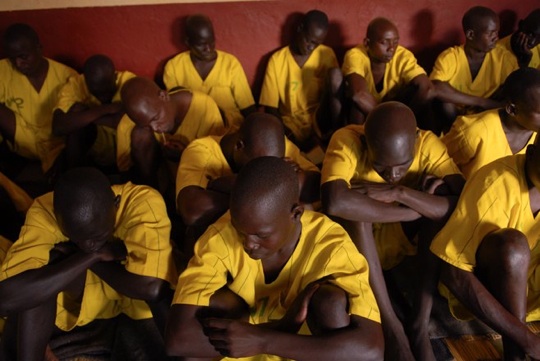Uganda’s criminal justice system is still slowly recovering from it’s colonial past. Sure we now have policemen who wear trousers and not Khaki shorts and offences like terrorism, a sign of truly modern times, are trending. Sadly though, the scaffolding of the criminal justice system, the bodywork of crimes, their investigation, prosecution, conviction and prison- are running on the rusty template of Her Majesty’s pleasure save for a few changes- like the uniforms or perhaps modern tools. On Monday evening our guests on the Hot Seat (933 KFM) were Commissioner General of Uganda Prisons Dr. Johnson Byabashaijja, a 28-year career jailer who has been re-appointed to new term to the top job. A moustache wearing cerebral and politically adept professional, I know Byabashaijja well. Our paths crossed when he asked for help in a campaign to increase funding to Uganda’s prisons in the hope of expanding the physical space and therefore the conditions in some of the most crowded centers. “ It worked actually” he said yesterday.
A running joke between us is my self interest in seeing more humane conditions in prisons considering my exposure to possible jail term arising from my work as a journalist.
Prisons have expanded – regional prisons are doing better but there remains incredibly more work ahead.
On the show Byabashaijja faced off with HRW’s Maria Burnett- another professional I know well. Maria has a new report focussing on the living conditions of prisoners. She has been publishing at the furious pace on human rights in Uganda since she got her in 2008 and is generally treated like a leper by politicians. Indeed she is not allowed to visit prisons she says. Her relationship with Byabashiajja is better but she says he has kept her out of his prisons because he says he needs political clearance to allow her continue her research. There is a new minister in charge of his sector.
They make for a revealing show about the sometimes irrational system of incanceration whose relationship with the the traditional goals of punishment and reform is very distant.
Going by the report “ Even dead bodies must work”. Health, Hard Labor and abuse in Uganda Prisons” few things have changed since the colonial days. In the studio the two trade different views on the degree of reform, not so much that reform was absent but that it was slow. It turns out that where prison labor in the old days was used to farm cash crops that the Colony exported, today prisoners, still treated to the same conditions (beatings, starvings and corrupt local minders) are hired to private farms and gardens. It’s a racket that thrives in locally administered prisons, which have only recently been brought under the central prisons authorities.
Perhaps more telling is how the criminal justice system itself has maintained its colonial shell and failed to emerge to the new realities of Ugandan society today.
When I first researched prison life- the main prison population were incarcerated for defilement. This offence is what is known as statutory rape. Uganda’s new “best practice” laws of the 90’s advocated strongly on behalf of young girls. The problem is that the whole countryside contracted marriages before girls reached the age of 18. So while the modern law had good intentions it clashed with the society around it. Eventually politicians and judges redefined the offence and relieved the prisons of young men who were increasingly headed to prisons for pre-marital sex ( at which point upset parents would yell hell and murder over bride price and haul them to the station). Judges observed that often some young woman would come plead to have her “defiler” set free. It was a telling lesson of the “foreign law” fighting the society.
Yesterday I learned however that the prison population has increased in the country’s 223 facilities to over 30 thousand inmates. When I last worked on this story around 2006- the figure of inmates was around 26 thousand. According to Byabashaijja the new rush is essentially because more convictions are swelling the numbers of inmates who don’t leave. While alleged defilers don’t form the main prison population anymore he worries about forth coming changes in the law too.
Long-term incarceration used to be 20 years but courts have hardened. With more modern eyes. They say life in prison means well never leaving prison. This imposes a long term cost and keeps prison numbers on the rise especially because of the long remand times.
Maria notes, like most journalists would agree, that recent political trends have contributed to the rising numbers. It is still a picture of the system fighting the population. The criminal justice system is a poor arbiter of real problems in society and sadly not very efficient to boot.
Consider that 54.6% ( more than half) of all inmates are on remand. A severe case backlog keeps them in jail. Remand is basically extra-judicial punishment because it is a jail sentence before any sentence related to the offence. Prison authorities now fret about proposed legal reforms to deny bail for some “political” offences that will surely send more inmates their way. Add to this the undeveloped alternative justice systems which like community service ( a cousin of community policing) remain in doldrums.
This is not the picture of a legal system that looks to reform and not necessarily punish. So bad is the administration of justice that HRW notes many of these current inmates, innocent under the law, catch terrible diseases and are more likely to die in prison than outside because of HIV/AIDS or tuberculosis.
No serious effort has been made to look at how else Uganda can avoid sending so many to jail (which is another separate problem with HRW reports which consider particular rights abuses out of context of the society they derive). No robust debate exists in political life to understand the nature of crime and its punishment.
We managed at the end of the show to press it on both parties to take a hard look at the Inspectorate arm of the Prisons service that ensures compliance. However this points to what happens in prisons and not outside where in my view the law remains as alien as it did when colonialism run affairs here.
One relic of the times is Uganda’s conservative view of homosexuality. Britain as moved on but the old colony here considers this a crime (y’all heard how modern law makers in Uganda even proposed a death penalty for “gay crimes”). The irony is that most sex between men takes place in the overcrowded prisons that we have failed to resolve. Now Byabashaijja says was no to condoms in jail despite HIV “ until Parliament changes the policy”. Homosexuality is an offence so even the incidence of male rape etc in prisons, perhaps the worse instance of transmission of HIV/Aids in a single adult male population, will not be treated by condoms because Ugandan society won’t confront this problem through modern lens. It hangs on to its colonial past.










